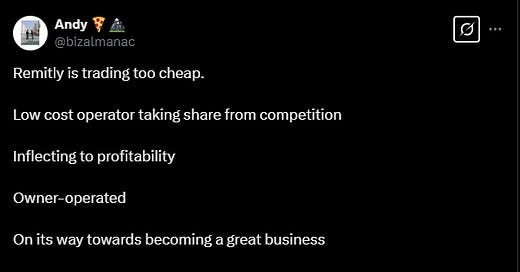///
Matthew Oppenheimer founded Remitly in 2011 while working as an American national for Barclays, a British bank, in Nairobi, Kenya. 10 years later, in September 2021, Oppenheimer IPO’d Remitly. Three years after that, in 2024 Q3, Remitly posted its first ever net income profitable quarter. Remitly is a remittances provider, processing cross border payments, often between family members. Remittances are a type of payment; Remitly is a payments business.
I’ve been long Remitly for a few months and am writing this post in the spirit of digging in, trying to answer a few questions:
Own or rent? - Is this business worth owning for the long term?
Grades - What grades can we assign Oppenheimer and Remitly in their first three years as a public company?
Circular reference - What risks does Remitly face?
Stupid model - What are return prospects from here?
The style of the man - Closing thoughts
My goal here is to let the numbers, the results, steer the discussion. We’ll also pick apart what management has shared during their earnings calls, conference appearances and interviews.
To get us started, here is a quote underscoring Remitly’s significance to it’s users:
We're asking customers who just moved to a new country or even if they've been here for years, to provide us with their name, address, date of birth, tax ID, if they don't have a social security number in the U.S. context, or social security number.
Then we're asking them to give us their funds, a big percentage of their hard earned money, think of somebody who makes like $20,000 or $30,000 a year and asking them to give us several hundred dollars of their funds and then trusting us to deliver it hundreds or thousands of miles away back home
-Matt Oppenheimer, 05/20/2024
Programming notes: All dollars are in USD. Remitly’s fiscal years align with calendar years.



